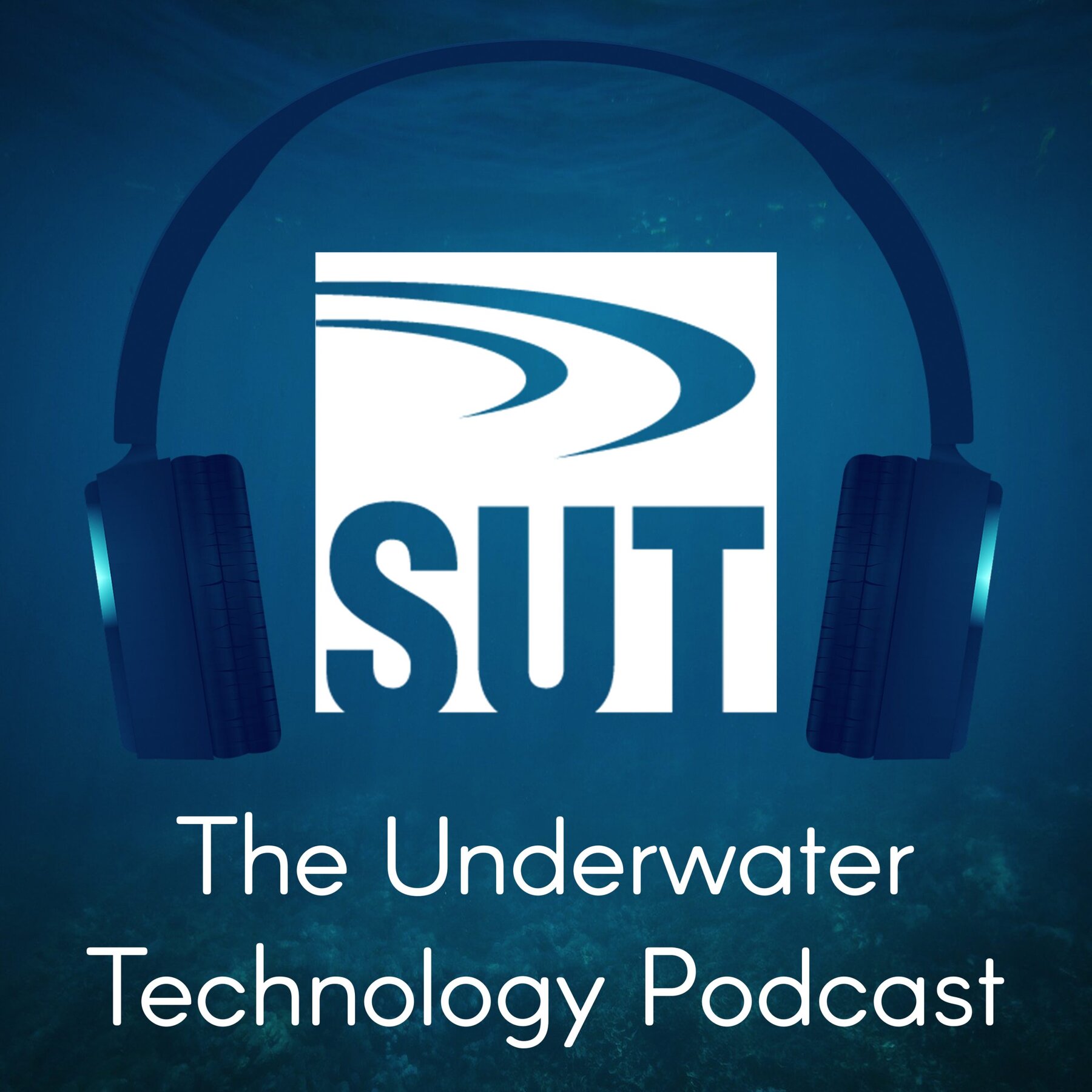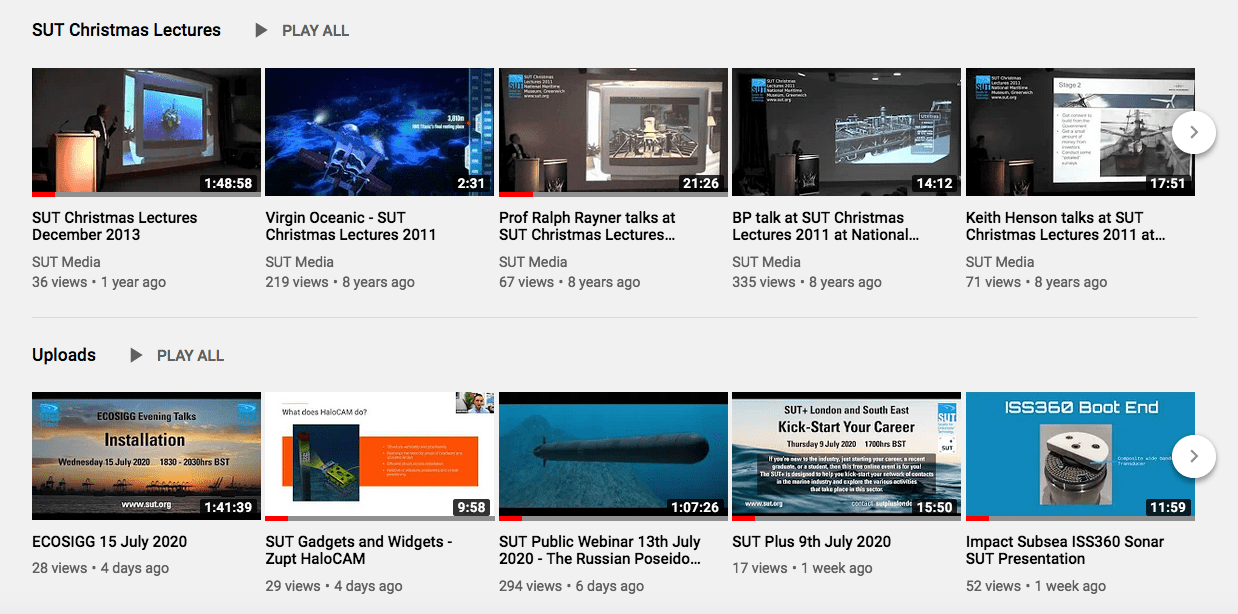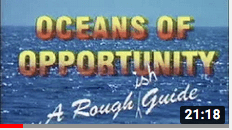TECHNOLOGY EXPLAINED
AN OCCASIONAL SERIES EXPLAINING UNDERWATER TECHNOLOGY – a video supplement to UT2, the magazine of the Society for Underwater Technology
Here are some videos
1. Small Vessels
2. Large Vessels
3. Sail Powered Vessels
TECHNOLOGY EXPLAINED
AN OCCASIONAL SERIES EXPLAINING UNDERWATER TECHNOLOGY – a video supplement to UT2, the magazine of the Society for Underwater Technology
Here are some videos
1. Small Vessels
2. Large Vessels
3. Sail Powered Vessels
Dear SUT Members,
 So how are we staying active while the world deals with COVID-19? We’ve been able to offer a much-expanded presence online, with many of you are already tuning in to the weekly podcast via sut.buzzsprout.com where we’ll soon pass 3000 downloads, plus a large number of streamed episodes, covering a wide range of subjects, with many more on the way – I’m always looking for new interviewees so get in touch if you’d like to be listened to by our international audience.
So how are we staying active while the world deals with COVID-19? We’ve been able to offer a much-expanded presence online, with many of you are already tuning in to the weekly podcast via sut.buzzsprout.com where we’ll soon pass 3000 downloads, plus a large number of streamed episodes, covering a wide range of subjects, with many more on the way – I’m always looking for new interviewees so get in touch if you’d like to be listened to by our international audience. Our fortnightly webinars and online training sessions are also popular, with the webinars uploaded on the SUT YouTube channel (SUT Media) which used to be hardly used, but now receives a healthy number of visits.
Our fortnightly webinars and online training sessions are also popular, with the webinars uploaded on the SUT YouTube channel (SUT Media) which used to be hardly used, but now receives a healthy number of visits. Older footage on the YouTube channel includes a selection of the school’s Christmas lectures and the SUT Careers video that was made back in the ‘Ian Gallett era’. We’re working hard to bring it all up to date, so please subscribe to the channel to see the latest uploads.
Older footage on the YouTube channel includes a selection of the school’s Christmas lectures and the SUT Careers video that was made back in the ‘Ian Gallett era’. We’re working hard to bring it all up to date, so please subscribe to the channel to see the latest uploads.Energy Transition is of course a very hot topic now, and we’ll be ensuring that SUT is well placed for our members to learn about offshore hydrogen, floating wind & solar, tidal stream, and other energy resources.
SUT represents the interests of our members on the UK government’s Marine Science Coordination Committee ‘Marine Industries Group’.
The whole MSCC has been rather quiet of late, as government departments have been distracted by the requirements of dealing with COVID 19, Brexit, & a series of closely spaced general elections, but on Friday 3rd July they released a new ‘Road Map Overview’ about the broad future direction of UK Marine Science – which has direct implications for our industry members too.
You can download a copy here
The science priorities of the revised roadmap are :
Better understand the capacity of the marine ecosystem to supply ecosystem services, natural resources and societal and economic benefits now and into the future.
Better understand the structure, function, resilience and variability of marine ecosystems.
Better understand the impacts of climate change, including its multiple stressors and feedbacks, and the ocean’s resistance and resilience to a changing climate.
Promote and represent UK marine science at international fora, strengthening existing and building new relationships with international partners including research organisations and infrastructure.
Better enable the efficient capture, storage, use and security of marine scientific data.
Better understand society’s relationship with our oceans and seas.
Better understand cumulative and in-combination impacts on the capacity of marine systems to supply food, energy and mineral resources as well as mitigate against the risk and effects of natural hazards.
Support the long-term monitoring, observing and mapping of the marine environment and ocean systems.
Facilitate the communication of high quality, up-to- date marine science and evidence.
The new areas of focus will drive procurement of science services, data, sensors and robots in coming years. SUT will continue to act as a voice for our members on the MSCC Marine Industries Group – contact CEO Steve Hall if you need to know more.